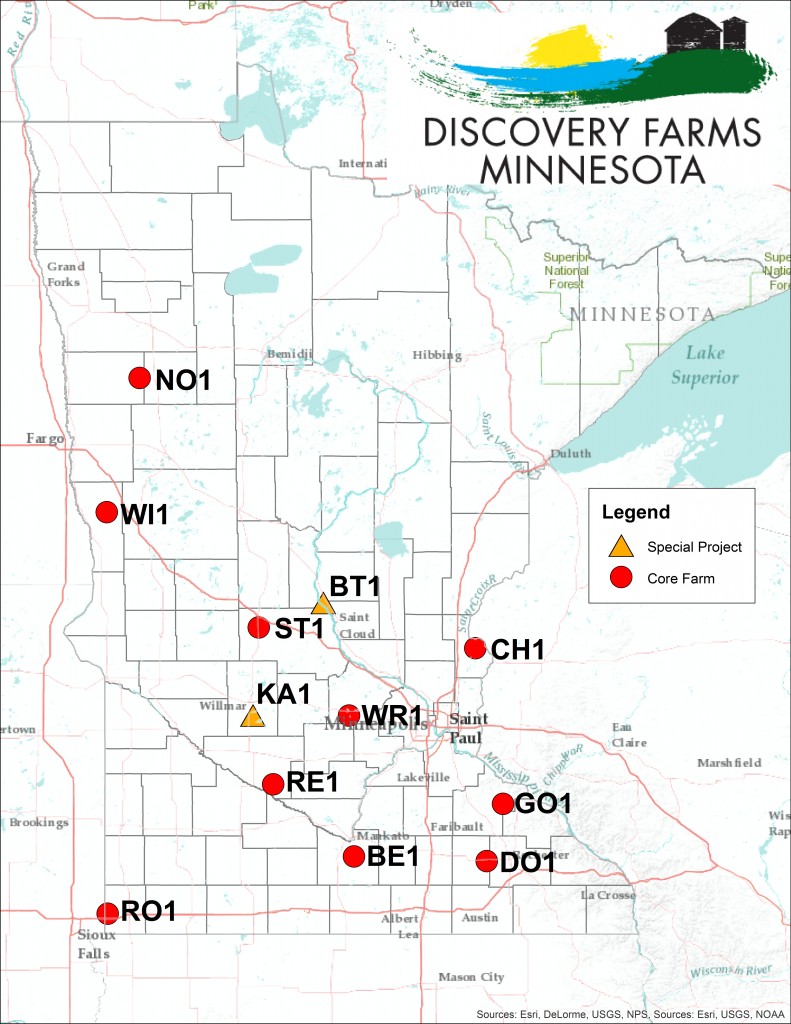 Discovery Farms Minnesota (DFM) is a farmer led water quality research and educational program. The mission of the program is to collect water quality information under real-world conditions and provide practical, credible, and site-specific information to support better farm management decisions. This program is designed to collect accurate measurements of sediment, nitrogen, and phosphorus movement over the soil surface and through sub-surface drainage tiles and generate a better understanding of the relationships between agricultural land management and water quality. DFM focuses on three core principles; farmer leadership, credible research, and effective communication.
Discovery Farms Minnesota (DFM) is a farmer led water quality research and educational program. The mission of the program is to collect water quality information under real-world conditions and provide practical, credible, and site-specific information to support better farm management decisions. This program is designed to collect accurate measurements of sediment, nitrogen, and phosphorus movement over the soil surface and through sub-surface drainage tiles and generate a better understanding of the relationships between agricultural land management and water quality. DFM focuses on three core principles; farmer leadership, credible research, and effective communication.
Farmer Leadership
DFM emphasizes farmer input and direction. DFM is organized by the Minnesota Agricultural Water Resources Coalition; a non-profit organization dedicated to assisting Minnesota farmers in addressing water quality concerns. A steering committee comprised of representatives from Minnesota farm, agribusiness, and conservation organizations guides the overall direction of the program, assists in the identification of research priorities and helps in the selection of cooperators and projects. Farm cooperators are critical to the success of this program. Knowledge and understanding of their farming system and local landscape is essential in connecting water quality data to farm management practices. Farmers participating in the DFM program work closely with key advisors to examine their existing farming system and explore and implement changes, if needed, to reduce or eliminate adverse environmental impacts.
Credible Research
Edge-of-field water quality data is collected year round from automated surface and tile water monitoring stations. DFM partners with the Minnesota Department of Agriculture and local conservation organizations to collect water quality data. These partnerships allow for collection of a high quality, unbiased dataset to be used for education and outreach activities. Details on the equipment used and standard operating procedures can be found here and here. The Minnesota Department of Agriculture installs and coordinates the edge-of-field monitoring stations and local conservation organizations are responsible for collection of samples and routine maintenance.
Effective Communication
An emphasis is put on communicating the results of DFM projects. Numerous field days are offered throughout the summer. These can be the best ways to learn about the program and see the actual farms and monitoring equipment. Frequent presentations are offered throughout the year at water quality and agricultural meetings. Publications and data write-ups can be found on this blog and the DFM website.
DFM has two types of projects: core farms and special projects. Core farms represent a farming system or setting that needs to be better understood and are selected to be representative of Minnesota agriculture. Core farms are typically long-term studies that begin with baseline water quality monitoring. Baseline monitoring is designed to identify the impacts of the farming system on the environment. Farmers agree to work with the program for a period of 5-7 years, which provides adequate time for identification of concerns and evaluation of the effectiveness of best management practices. There are currently 10 core farms in the program. There are dairy, swine, grain, and beef core farms from the sloping landscapes of Southeastern Minnesota to the flat regions of the Red River Valley in Northwestern Minnesota.
Special projects are often shorter term projects that focus on a specific environmental concern that has already been identified. The data collected are focused on a specific problem or question. There are currently two special projects in the program. A special project in Benton County focuses on collecting information on nitrate that moves below the root zone in an irrigated field. The Kandiyohi County special project is a partnership with University of Minnesota and focuses on bioreactor efficiency and methods of in-season nitrogen prediction in a continuous corn rotation and the resulting tile water quality.
- Lessons Learned from Schafer Farms – Implementing Conservation in a Rolling Landscape - April 8, 2020
- What happened to spring? - July 15, 2019
- Tile flow and nutrient movement in Northwest Minnesota - September 13, 2018
